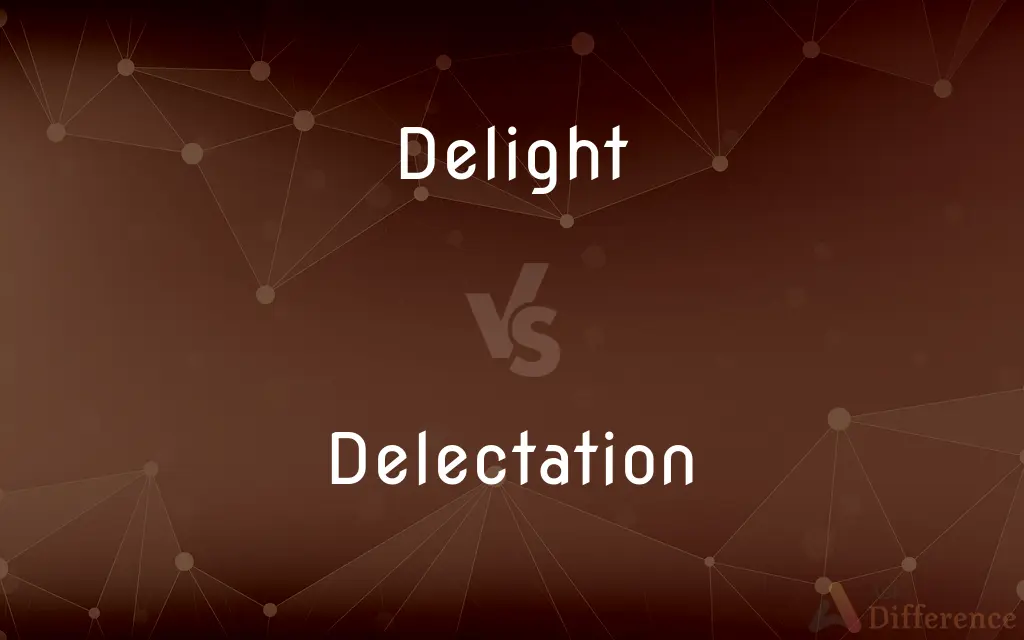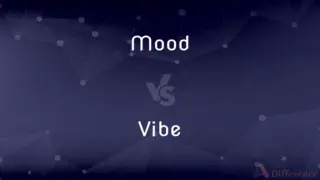Delight vs. Delectation — What's the Difference?
By Tayyaba Rehman & Urooj Arif — Updated on April 22, 2024
Delight refers to a high degree of pleasure, often spontaneous and emotional, while delectation suggests a more sophisticated enjoyment, often derived from the senses or intellect.

Difference Between Delight and Delectation
Table of Contents
ADVERTISEMENT
Key Differences
Delight often indicates a sudden or intense pleasure that can be sparked by unexpected good news or a pleasing event. It's typically an emotional response that is vivid and exhilarating. Whereas, delectation is a term that connotes pleasure derived from the act of savoring or enjoying something thoroughly, often with a connotation of leisure and intellectual engagement.
Delight is commonly used in everyday language and is accessible in its connotation, relating to simple joys and pleasures. On the other hand, delectation carries a more formal tone and is less commonly used, often appearing in literary or elevated contexts.
In terms of emotional response, delight can be seen as more visceral and immediate, often related to both small and large joys. Delectation, however, tends to be associated with a refined, contemplative pleasure, such as enjoying art, cuisine, or literature.
Delight is often experienced both individually and collectively, such as in celebrations or shared good news, making it a versatile term in social contexts. Conversely, delectation might be considered a more personal or individual experience, focusing on personal taste and preference.
While delight can be fleeting and momentary, delectation suggests a lingering enjoyment, something that one might indulge in or savor over a period of time. This difference highlights how the two terms can describe similar feelings of pleasure but at different intensities and durations.
ADVERTISEMENT
Comparison Chart
Definition
Intense pleasure or joy
Pleasure derived from savoring
Usage
Common, everyday language
Formal, literary contexts
Emotional Quality
Spontaneous, visceral
Refined, contemplative
Duration
Often brief and fleeting
Prolonged, savored
Social Context
Individual or collective
Mostly individual, personal
Compare with Definitions
Delight
Something that gives great pleasure.
Her new book is a delight to read.
Delectation
The state of being delighted.
She listened to the symphony in a state of delectation.
Delight
An expression of pleasure.
Her face lit up in delight at the surprise.
Delectation
Enjoyment from aesthetic or intellectual stimuli.
The art exhibit offers much delectation.
Delight
To please someone greatly.
This gift will delight her immensely.
Delectation
A source of enjoyment.
These old letters are a delectation to read.
Delight
Great pleasure or joy.
The child's laughter was a pure delight.
Delectation
Pleasure derived from savoring something.
The gourmet meal was prepared for his delectation.
Delight
A high degree of gratification.
His praise brought her immense delight.
Delectation
An act of savoring pleasure slowly.
He read the poem aloud for our delectation.
Delight
Great pleasure; joy
The proud parents' faces beamed with delight.
Delectation
Delight.
Delight
Something that gives great pleasure or enjoyment
The vacation was a delight for the whole family.
Delectation
Enjoyment; pleasure.
Delight
To take great pleasure or joy
Delights in taking long walks.
Delectation
Great pleasure; delight.
Delight
To give great pleasure or joy
An old movie that still delights.
Delectation
Great pleasure; delight.
Delight
To please greatly
A movie that will delight all audiences.
Delectation
A feeling of extreme pleasure or satisfaction;
His delight to see her was obvious to all
Delight
Joy; pleasure.
Delectation
Act of receiving pleasure from something
Delight
Something that gives great joy or pleasure.
Delight
To give delight to; to affect with great pleasure; to please highly.
A beautiful landscape delights the eye.
Delight
(intransitive) To have or take great pleasure.
Delight
A high degree of gratification of mind; a high- wrought state of pleasurable feeling; lively pleasure; extreme satisfaction; joy.
Sounds and sweet airs, that give delight and hurt not.
A fool hath no delight in understanding.
Delight
That which gives great pleasure or delight.
Heaven's last, best gift, my ever new delight.
Delight
Licentious pleasure; lust.
Delight
To give delight to; to affect with great pleasure; to please highly; as, a beautiful landscape delights the eye; harmony delights the ear.
Inventions to delight the taste.
Delight our souls with talk of knightly deeds.
Delight
To have or take great delight or pleasure; to be greatly pleased or rejoiced; - followed by an infinitive, or by in.
Love delights in praises.
I delight to do thy will, O my God.
Delight
A feeling of extreme pleasure or satisfaction;
His delight to see her was obvious to all
Delight
Something or someone that provides pleasure; a source of happiness;
A joy to behold
The pleasure of his company
The new car is a delight
Delight
Give pleasure to or be pleasing to;
These colors please the senses
A pleasing sensation
Delight
Take delight in;
He delights in his granddaughter
Delight
Hold spellbound
Common Curiosities
How is delectation typically experienced?
Delectation is usually experienced through a prolonged, thoughtful engagement with something enjoyable.
How does the duration of delight compare to that of delectation?
Delight is typically brief and fleeting, while delectation is more about prolonged enjoyment.
Is delectation used in casual conversation?
No, delectation is more commonly used in formal or literary contexts.
What kind of events might evoke a feeling of delight?
Events like surprise parties, achievements, or receiving good news can evoke delight.
Are there specific contexts where delight is more appropriate than delectation?
Yes, delight is more appropriate in everyday, spontaneous contexts, while delectation fits formal or aesthetic appreciations.
What is the key emotional quality of delight?
Delight is characterized by its spontaneous and visceral emotional quality.
Can delight be used to describe reactions to simple pleasures?
Yes, delight can describe reactions to both simple and significant sources of joy.
What are typical sources of delectation?
Typical sources include fine dining, art, and literature.
What makes delectation different from delight in terms of pleasure?
Delectation implies a more sophisticated, often intellectual pleasure compared to the more emotional and immediate pleasure of delight.
Can both terms be used interchangeably in poetry?
In poetry, the terms can be used to evoke different nuances of pleasure but are not exactly interchangeable due to their distinct connotations.
Share Your Discovery

Previous Comparison
Grin vs. Scoff
Next Comparison
Mood vs. VibeAuthor Spotlight
Written by
Tayyaba RehmanTayyaba Rehman is a distinguished writer, currently serving as a primary contributor to askdifference.com. As a researcher in semantics and etymology, Tayyaba's passion for the complexity of languages and their distinctions has found a perfect home on the platform. Tayyaba delves into the intricacies of language, distinguishing between commonly confused words and phrases, thereby providing clarity for readers worldwide.
Co-written by
Urooj ArifUrooj is a skilled content writer at Ask Difference, known for her exceptional ability to simplify complex topics into engaging and informative content. With a passion for research and a flair for clear, concise writing, she consistently delivers articles that resonate with our diverse audience.
















































